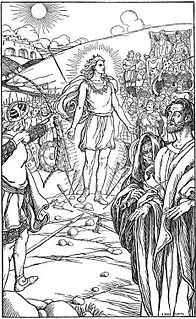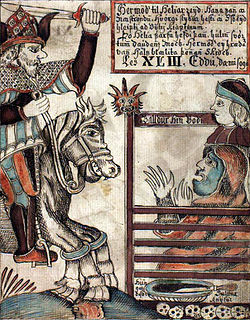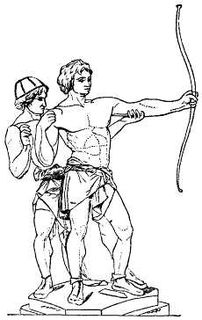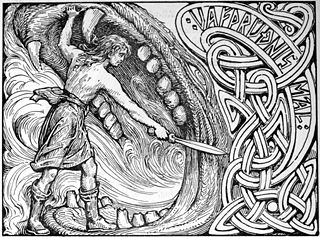 W
WBaldr is a god in Germanic mythology. In Norse mythology, Baldr is a son of the god Odin and the goddess Frigg, and has numerous brothers, such as Thor and Váli. In wider Germanic mythology, the god was known in Old English as Bældæg, and in Old High German as Balder, all ultimately stemming from the Proto-Germanic theonym *Balðraz.
 W
WIn Norse mythology, Heimdallr is a god who possesses the resounding horn Gjallarhorn, owns the golden-maned horse Gulltoppr, is called the whitest of the gods, has gold teeth, and is the son of Nine Mothers. Heimdallr is attested as possessing foreknowledge, keen eyesight and hearing, and keeps watch for invaders and the onset of Ragnarök while drinking fine mead in his dwelling Himinbjörg, located where the burning rainbow bridge Bifröst meets the sky. Heimdallr is said to be the originator of social classes among humanity and once regained Freyja's treasured possession Brísingamen while doing battle in the shape of a seal with Loki. Heimdallr and Loki are foretold to kill one another during the events of Ragnarök. Heimdallr is additionally referred to as Rig, Hallinskiði, Gullintanni, and Vindlér or Vindhlér.
 W
WHermóðr is a figure in Norse mythology, a son of the god Odin and brother of Baldr. He is often considered the messenger of the gods.
 W
WHöðr is a blind god and a son of Odin and Frigg in Norse mythology. Tricked and guided by Loki, he shot the mistletoe arrow which was to slay the otherwise invulnerable Baldr.
 W
WSkjöldr was among the first legendary Danish kings. He is mentioned in the Prose Edda, in Ynglinga saga, in Chronicon Lethrense, in Sven Aggesen's history, in Arngrímur Jónsson's Latin abstract of the lost Skjöldunga saga and in Saxo Grammaticus' Gesta Danorum. Under the name Scyld he also appears in the Old English poem Beowulf. The various accounts have little in common.
 W
WIn Germanic mythology, Thor is a hammer-wielding god associated with lightning, thunder, storms, sacred groves and trees, strength, the protection of mankind and also hallowing and fertility. Besides Old Norse Þórr, extensions of the god occur in Old English as Þunor and in Old High German as Donar. All forms of the deity stem from a Common Germanic *Þunraz.
 W
WIn Norse mythology, Víðarr is a god among the Æsir associated with vengeance. Víðarr is described as the son of Odin and the jötunn Gríðr, and is foretold to avenge his father's death by killing the wolf Fenrir at Ragnarök, a conflict which he is described as surviving. Víðarr is attested in the Poetic Edda, compiled in the 13th century from earlier traditional sources, the Prose Edda, written in the 13th century by Snorri Sturluson, and is interpreted as depicted with Fenrir on the Gosforth Cross. A number of theories surround the figure, including theories around potential ritual silence and a Proto-Indo-European basis.
 W
WOld Norse Yngvi, Old High German Ingwin and Old English Ingƿine are names that relate to a theonym which appears to have been the older name for the god Freyr. Proto-Germanic *Ingwaz was the legendary ancestor of the Ingaevones, or more accurately Ingvaeones, and is also the reconstructed name of the Elder Futhark rune ᛜ and Anglo-Saxon rune ᛝ, representing ŋ.